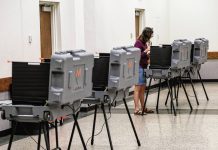State Representative District 59 GOP Republican candidate
Name: JoAnne Flohr (Jo)
Political party: Republican Party
Age: 66
City of residence: Columbus
Occupation: Ohio Township trustee, co-owner of Flohr Quarter Horses
Education: Columbus High School, 1969; attended Ball State University; real estate license, brokers license, Graduate Realtors Institute.
Previous offices held: Ohio Township Advisory Board, 2006–12; Ohio Township Trustee, 2012-18
Previous offices sought: Ohio Township Advisory Board, 2006-09 and 2010-12; trustee, 2012-14 and 2015–18.
Community Involvement: Southwest Volunteer Fire Department volunteer; Southwest Volunteer Fire Department, board secretary.
Immediate family: Husband, Dave; two daughters, a son and five grandchildren
[sc:pullout-text-end][sc:pullout-title pullout-title=”JoAnne Flohr Q&A” ][sc:pullout-text-begin]
Q: As one of five states without a hate-crime law, should Indiana pass a law that would allow judges to deliver stiffer penalties for crimes of bias?
A: Actually, Indiana already has a bias (hate) crime statute on the books that provides judges with sentencing flexibility in these instances. Better reporting and tracking of hate crimes is necessary and some improvements in the law to broaden its coverage may be beneficial.
Q: In the aftermath of school shootings, what steps can Indiana take to create a safer environment for its students?
A: Providing a safe learning environment for our children is obviously very important. I would support additional state and federal funding to pay for better school building security, training and early intervention counseling for troubled students.
Q: Should handgun license fees in Indiana be maintained or eliminated? Why?
A: Handgun license processing fees should be maintained. The fees are often one-time. Indiana law enforcement leaders have explained that they rely on these funds to cover the costs of licenses, but also other important law-enforcement programs.
Q: Growing numbers of children are at risk due to impacts of escalating opioid abuse. What are some first steps the state should take?
A: State agencies must identify the sources of prescription and illegal opioids and take action to close the valve. Opioid users aren’t just addicts, they are also victims. We need to develop programs to identify them, reduce the stigma or fear of punishment, and get expanded treatment and family-support programs.




